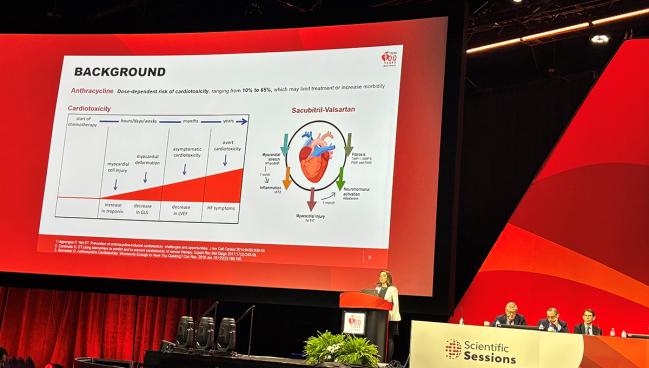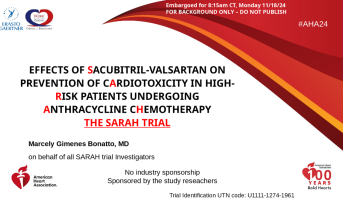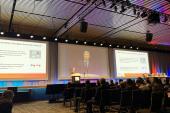ARNI Lessens Anthracycline Cardiotoxicity in High-Risk Patients: SARAH
In positive early data from the RCT, sacubitril/valsartan given over 24 weeks reduced signs of heart damage in cancer patients.

CHICAGO, IL—Taking sacubitril/valsartan (Entresto; Novartis) can help protect against the cardiotoxicity posed by anthracycline chemotherapy for high-risk patients with cancer, results from the randomized, placebo-controlled SARAH trial suggest.
This is the first such trial to demonstrate the angiotensin receptor-neprilysin inhibitor (ARNI), which is US Food and Drug Administration approved for various forms of heart failure, has potential as a protective strategy in this setting, according to investigator Marcely Gimenes Bonatto, MD (University of São Paulo, Brazil).
Anthracyclines, widely used to treat many kinds of malignancies, have long been known to “carry a substantial risk of dose-dependent cardiotoxicity ranging from 10 up to 65%,” Bonatto said when presenting the late-breaking data today at the American Heart Association (AHA) 2024 Scientific Sessions. “Previous studies on cardioprotective strategies have shown mixed results, especially when protocols use lower doses of anthracycline.”
In SARAH, anthracycline doses also were low, but this time investigators targeted high-risk patients with evidence of chemotherapy-induced myocardial injury, said Bonatto. They chose to test the ARNI due to its role as a “cornerstone therapy” in heart failure, she added, and promising data from animal models supporting its potential as a cardioprotective strategy.
Discussant Bonnie Ky, MD (Penn Medicine, Philadelphia, PA), following Bonatto’s presentation, spoke to the clinical need of these patients, noting, “The fundamental question that cardio-oncology has been studying for the past number of decades is: how do we prevent the dose-dependent risk of anthracycline cardiotoxicity?” Researchers have explored numerous options, including neurohormonal therapies, dexrazoxane, and statins, in trials such as PROACT, Cardiac CARE, STOP CA, and PREVENT.
“Sacubitril/valsartan was safe, tolerated, and demonstrated preliminary efficacy,” Ky agreed, describing the SARAH trial’s design as “very rigorous.”
Less Global Longitudinal Strain at 24 Weeks
For the double-blind study, Bonatto and colleagues enrolled 114 adults with cancer (average age 52 years; 90% women; 92% white) undergoing anthracycline chemotherapy at Erasto Gaertner Hospital in Curitiba, Brazil. All were considered high risk due to having an increase in high-sensitivity troponin I above the 99th percentile after a chemo session. Nearly 81% were being treated for breast cancer, and the rest for lymphoma, sarcoma, or leukemia.
SARAH’s participants were randomized to sacubitril/valsartan or placebo twice daily for 24 weeks. The treatment arm started out at a dose of 24/26 mg, which was then titrated every 2 weeks until patients reached either a dose of 97/103 mg twice daily or the highest tolerated without side effects. Comorbidities were equally distributed between the two groups, with the most common being hypertension (32%)
Incidence of cardiotoxicity (≥ 15% reduction in global longitudinal strain [GLS] of the left ventricle) after 24 weeks, the study’s primary endpoint, was a relative 77% lower with the ARNI than with placebo (7.1% vs 25%; P = 0.015), with a number needed to treat was 5.59. The between-group difference was independent of cumulative dose of anthracycline, HER2 positivity, presence of hypertension, and age.
On average, GLS improved by 2.55% in the treatment group and worsened by 6.65% in the placebo group over the course of the study (P < 0.001).
Compared with controls, patients in the sacubitril/valsartan group also were less likely to have an LVEF < 50% on cardiac magnetic resonance (3.7% vs 17.0%; P = 0.029) and GLS < 18% (25.0% vs 48.2%; P = 0.018). Echocardiography showed a similar trend. Clinical events were rare and occurred at similar rates in both groups.
ARNI patients were more likely to experience hypotension compared with controls (14% vs 1.8%; P = 0.032) and had higher mean potassium levels (4.31 vs 4.16 mmol/L; P = 0.047). Discontinuation rates; levels of creatinine, blood pressure, troponin, and NT-proBNP; and heart rate did not differ by study arm.
Ky, in terms of next steps, said, “Undoubtably, we need to validate these findings in larger populations, but they do generate important hypotheses that motivate studies in cardioprotection with ARNIs. Moreover, it emphasizes the importance of identifying higher-risk populations.”
Going forward, “we need to define the sustainability of this response” seen in SARAH and its impact on longer-term clinical outcomes, she specified. “And validation is necessary prior to clinical implementation.” Data from the PRADA II trial, which will provide 18 months of follow-up for sacubitril/valsartan in breast cancer patients, are eagerly awaited, Ky added.
Tochi M. Okwuosa, MD (Rush University, Chicago, IL), who commented on the SARAH findings during an AHA media briefing, delved into the dual mechanisms of sacubitril/valsartan in heart failure. “The general idea behind sacubitril is that it’s beneficial to the natriuretic peptide system, but we have to give it with valsartan” to blunt the negative effects that arise from sacubitril blocking neprilysin, she explained. This begs the question: why can’t valsartan be used alone?
Indeed, the cost of sacubitril/valsartan has been an obstacle to uptake in the past, though the US Centers for Medicare & Medicaid Services announced this August that the government is negotiating for a better price. Valsartan, alone, is less expensive than the two-drug compensation.
To TCTMD, however, Bonatto said the single-drug strategy for cardioprotection is unlikely to be successful, because animal studies have shown valsartan to be inferior to sacubitril/valsartan for cardioprotection.
Following SARAH, said Bonatto, “the next step is to perform another trial with longer follow-up where we can observe if this difference [between sacubitril/valsartan and placebo] is still getting higher or if it attenuates over time.”
Caitlin E. Cox is Executive Editor of TCTMD and Associate Director, Editorial Content at the Cardiovascular Research Foundation. She produces the…
Read Full BioSources
Bonatto MG. Effects of sacubitril-valsartan on prevention of cardiotoxicity in high-risk patients undergoing anthracycline chemotherapy: the SARAH trial. Presented at: AHA 2024. November 18, 2024. Chicago, IL.
Disclosures
- Bonatto reports financial relationships with Novartis, AstraZeneca, Boehringer, Bayer, Merck, Novo Nordisk, and Viatris.






Comments